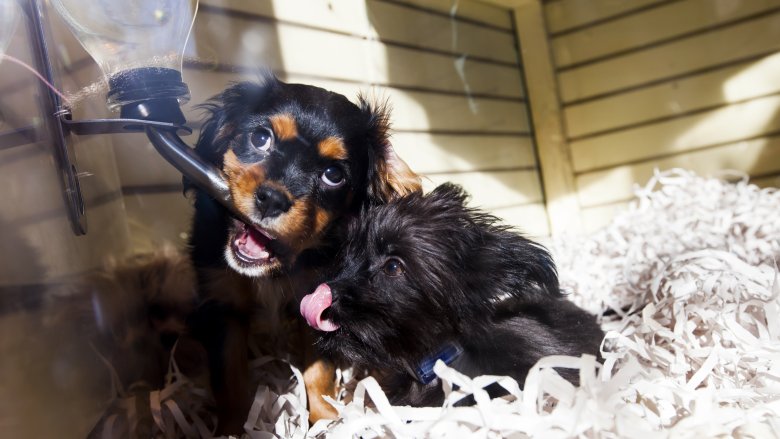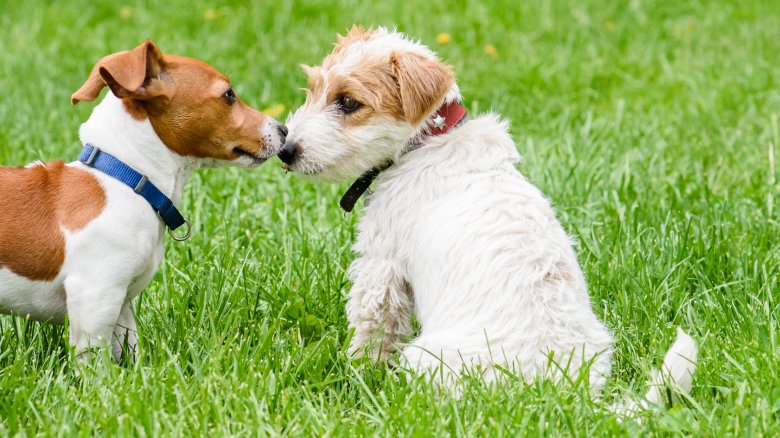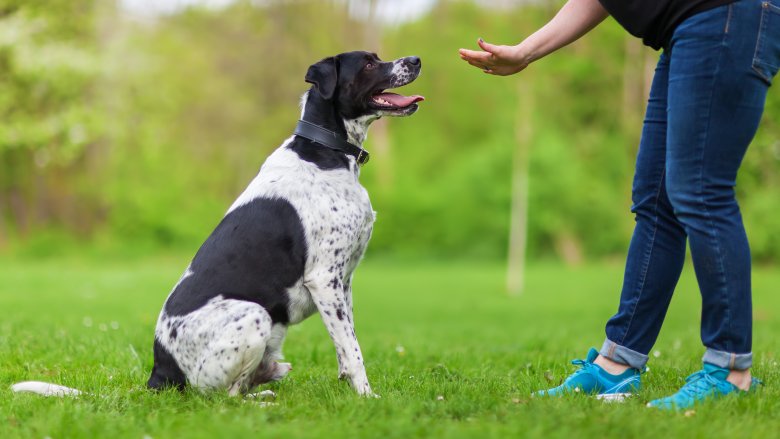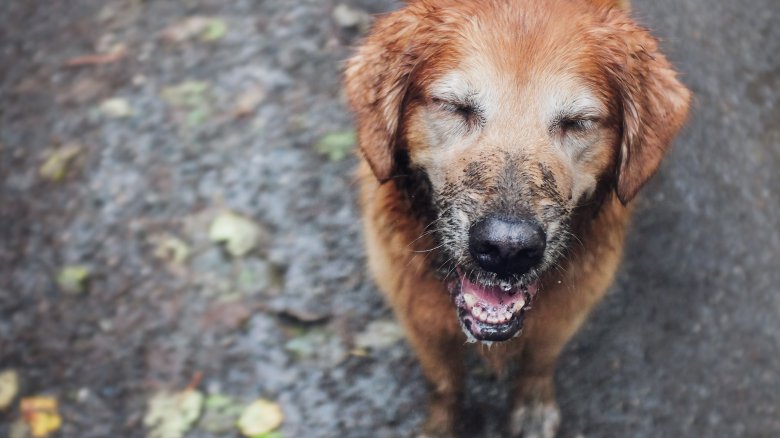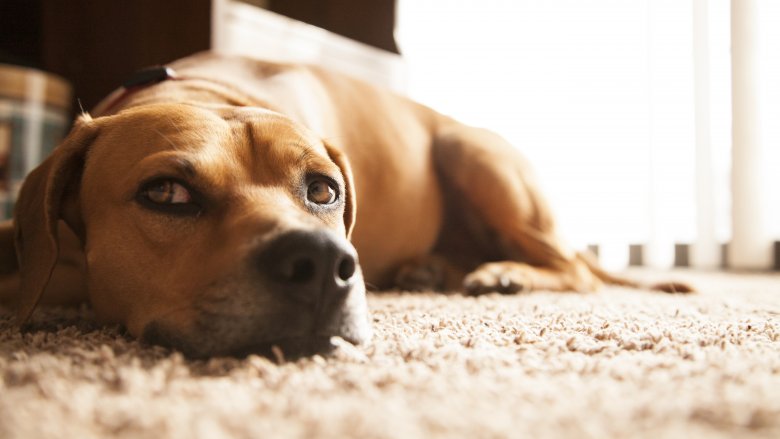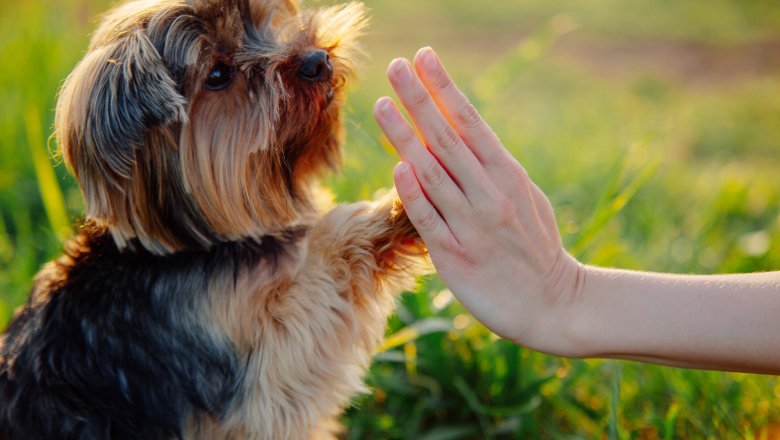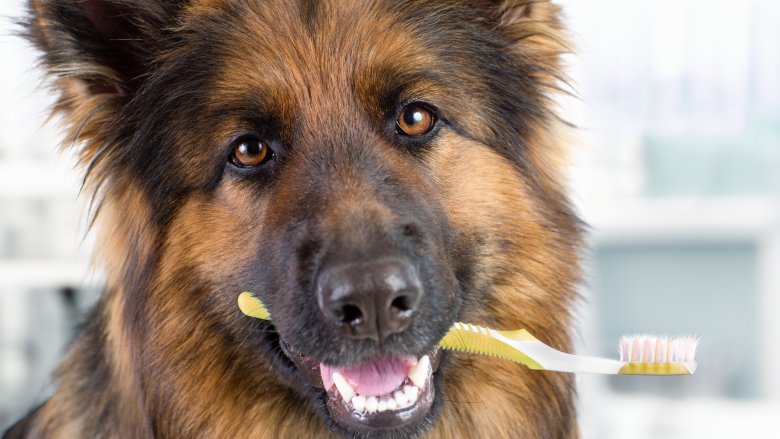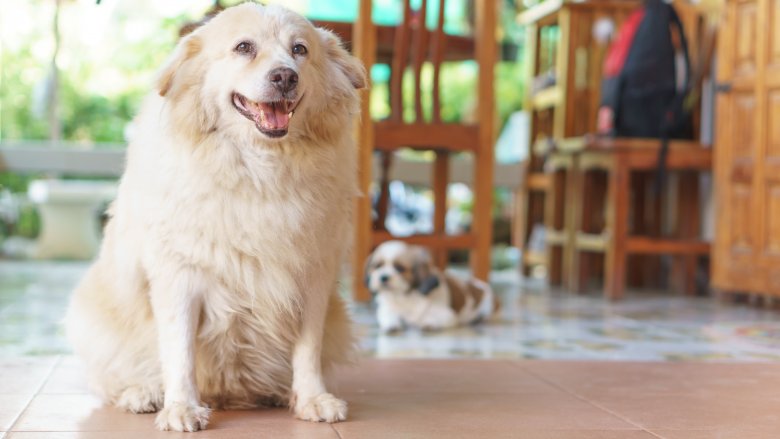Mistakes You Never Knew You Were Making With Your Dog
As a dog owner, you want your dog to have the best life possible. After all, your dog provides you with unconditional love and cuddles. If you're like me, you love them like a family member. But since you're a human, you might make a few mistakes with your dog without even realizing it. Here are a few of the common mistakes, shared with me by veterinarians and dog trainers.
Not doing your research before getting a dog
One of the best ways to set yourself up for success with your dog is to be prepared from the outset. Dr. Rachel Barrack, Doctor of Veterinary Medicine of Animal Acupuncture told me in our interview, "Owning a dog or cat is a responsibility for the lifetime of that pet. Make sure you are prepared before making that commitment. Pets require time and money."
In addition, be careful when selecting which type of breed to adopt. Barrack added, "If you are interested in a specific breed of dog, do your research first. Do not make an impulse decision. Some dogs require a lot more activity than others, some dogs do not do well left alone for long periods, some do not do well with small children or cats. Make sure to make the right choice for your home and lifestyle."
A little bit of research and forethought will save you a lot of headaches later on.
Purchasing your dog from a pet store
In addition to researching the type of dog you should get, also research where you get your dog as well. Barrack told me, "Often times pet stores obtain dogs from puppy mills. Puppy mills confine dogs in overcrowded and unsanitary, deplorable conditions. Their purpose is to churn out puppies for profit with little concern for the well being of the dogs."
Instead, Barrack recommended, "Do not support this cause. Rescue a dog from your local animal shelter or carefully research a quality, reputable breeder."
There are so many great dog rescues out there, and many of them will provide a lot of information about the dogs in their care. They'll help you choose the right dog for you, as well.
Waiting too long to socialize a puppy
If you decide to get a puppy rather than an adult dog, you have a great opportunity to train your dog and help them develop the behaviors you want. But you also have the responsibility of socializing them at a very young age.
Dr. Gary Richter, doctor of veterinary medicine, veterinary health expert, and Dog People Panel member with Rover.com told me, "As a general rule, the earlier the better for socializing your puppy. The 'magic' window for socialization of puppies ends around 14 weeks of age. Up until then, they are very open to new experiences and are learning what is 'normal' in their world."
Waiting until your dog is older to socialize them can cause problems. Dr. Richter added, "After 14 weeks, they can become suspicious and fearful, making socialization more challenging. The more healthy, well-vaccinated dogs you can introduce a new puppy to the better."
He continued, "The same goes with introducing them to people, cats, etc. It has to be done in a safe environment though. Puppy classes, enclosed yards, or someone's house are all okay. Avoid sidewalks, dog parks, and anywhere else that you don't have control of which dogs come and go. Until the puppy is fully vaccinated, he is at risk. Safe socialization is the key."
Being inconsistent when training your dog
I have a friend who is a dog trainer, and he told me that the hardest part of his job is training the dogs' owners. One of the easiest mistakes to make as a dog owner is not being consistent with your training. I also spoke with Alison Patrolia, certified veterinary technician and dog trainer with Hub City Dog Training, and she agreed with my friend.
Patrolia told me, "Inconsistency is commonly seen when pet owners do not follow through with a command or schedule routine for their dog. The consequences that result is a confused dog that will then assume that he/she does not have to do that particular command."
She provided a few examples as well: "For instance, if some pet owners allow their dog to jump up, but another person in the household does not want them to, then the dog is unclear of the expectations and will continue to jump up unless all involved ask the same of the dog (which would be not to jump up)."
If you're having a hard time staying consistent because you and the other members of your household have different expectations of your dog, it's worth it to have a conversation with them about dog training. A dog who has consistency will be more likely to behave the way you want them to.
Waiting too long to discipline your dog
Have you ever come home to a puddle of pee on the floor, or worse, a ripped up pair of shoes? When that happens, as much as you probably want to discipline your dog right then, you should know that it will do more harm than good.
Patrolia told me in our interview, "We as pet owners can assume the dog "knows" what they did and that is why they are hiding when we come home. In reality, they are hiding due to the response the owner had to the circumstance."
Unlike us, she said, "Dogs live in the present, which means discipline and praise must be given exactly when the behavior occurs. If you come home to find the dog has chewed the couch, but they are now sleeping on the floor, you will not be successful in teaching the dog that chewing the couch was unacceptable."
She continued, "If you yell, it will frighten the dog because he was sleeping. He doesn't make the connection that chewing the couch was wrong. This can teach him to hide when you return because the last time he was in the room with a chewed couch, he got frightened from the owner yelling."
Patrolia added, "As pet owners, the way we respond and communicate definitely shapes the bond with our dogs. We have to remember that they are not little people in dog costumes and respect they have certain communication, mental and lifestyle needs."
Not giving your dog enough mental stimulation
Dogs get bored just like humans do. And your dog's destructive behavior might be a result of boredom. Make sure that you give them enough mental stimulation that they don't resort to destroying things.
Patrolia told me, "Sometimes dogs can be destructive, not only due to lack of boundaries and discipline, but also lack of mental stimulation. Some owners complain that they take their dog outside and let him run and run, yet the dog continues to be destructive and they don't know why. They think he has had plenty of exercise."
However, just as a workout doesn't provide the mental stimulation you need, running around doesn't keep your dog from getting bored. Patrolia continued, "The running may burn energy, but their dog is not getting exhausted due to lack of mental stimulation. Their dog could benefit from hide-and-seek with treats or toys, puzzle games, or enriching their environment by hiking (to navigate different terrain and sights) in lieu of just running."
She shared this good news: "Once your dog is mentally satisfied, he will be more open to less destruction due to being mentally satisfied. Plus mental stimulation such as hiking creates a bond between pet owner and dog, and is fun."
Not using teachable moments with your dog
Just as you can use teachable moments to teach your kids throughout the day, teachable moments will help your dog learn, as well. Patrolia told me, "Teachable moments are used all during the day with your dog. 'Training' doesn't just occur 5-10 minutes a day. You are teaching your dog every moment, and believe me, they are learning every moment (good and bad)."
She added, "When your dog is with you, you can use those moments to correct the inappropriate actions and encourage the positive actions. As pet owners, we focus on a lot of the negative behaviors, which do need to be handled, but focusing on the positive behaviors will encourage those."
For example, Patrolia said, "If you are hiking with your dog, have them practice sit each time you stop..., practice stay and incorporate training in your hiking sessions. Training in different locations also provides a well-rounded dog."
Neglecting oral hygiene
Do you brush your dog's teeth or give them treats to strengthen their gums? If not, start today. Dr. Richter told me, "One of the most important but often overlooked daily routines for your dog is caring for his teeth. Roughly 85 percent of dogs will develop dental disease in their lifetime, most before they are three years old."
You may think dental disease isn't a big deal. Not so. Dr. Richter told me, "Dental disease can be debilitating — even deadly — as bacteria in the gums gets into the bloodstream. To avoid this, you should (ideally) brush his teeth every day. It takes 48 hours for plaque to mineralize into tartar and if you brush every day, tartar won't have the chance to form."
You brush your teeth twice a day as part of your daily routine. Add a doggie tooth brushing to your routine as well, and your dog will have happy, healthy teeth and gums.
Choosing the wrong pet food
How much thought do you put into choosing your dog's food brand? Just as your diet makes a big difference in your quality of life, your dog's food has a big impact on how they feel.
Dr. Richter told me, "Without a doubt, the single biggest thing you can do to keep your dog happy and healthy is provide them with optimal nutrition. This means a fresh, whole food diet such as a balanced diet of fresh raw or cooked food. Freeze dried or dehydrated fresh foods can work well also."
He added, "I recommend my patients stay away from kibble or canned foods. The first step with pet foods is to keep the ingredients natural. No artificial ingredients or preservatives should ever be used. Dogs are somewhat omnivorous, so their food does not need to be 100 percent meat-based. That said, the protein source in the food should be 100 percent meat-based."
In addition, he said, "While dogs are equipped to handle a certain amount of carbohydrates in their diet, they should not be a majority ingredient (such as is found in kibble). Inexpensive and filler ingredients such as meal, corn, wheat, etc. are best avoided."
Many dog food brands now offer a "grain free" option. If you don't want to to cook your dog a hot meal every night or feed them fresh food, at least check the ingredients before you buy your next bag of dog food.
Overfeeding your dog
The amount of food you feed your dog is just as important as the type. I would know — I adopted an obese sheltie when she was five and a half years old. Unfortunately, even when I was able to bring her weight down, she still suffered from many health issues due to having been obese in the past.
To make sure your dog is a healthy weight, carefully measure the amount of food you give them. Dr. Barrack told me, "Obesity is an epidemic in pets. Overfeeding can cause many health issues (including arthritis and diabetes) that are largely preventable with an appropriate diet. Consult with your veterinarian about which food (and how much of that food) is right for your pet."

